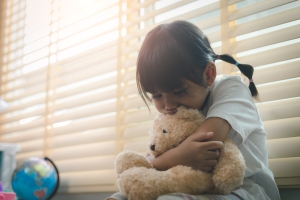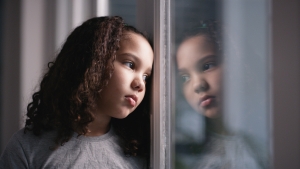how to recognize signs of sadness in children and show your support

We all experience sadness from time to time. Oftentimes, our sadness is linked to an event that causes us some emotional distress like the death of a pet or a loved one, issues with a friend, or hearing news that is upsetting. Sometimes, we struggle with feelings of sadness for seemingly no reason. Kids can struggle with sadness too but it may look different from how adults experience sadness. Let’s talk about the myths and facts of sadness in kids and how you can show support.
different ways kids show sadness

myth #1: Sadness in kids means they could cry a lot and say they feel sad.
Fact: Sadness in kids can look different than in adults. Sadness can look like:
- Looking tearful or irritable or both
- Not enjoying activities that they used to (not because they have outgrown them)
- Withdrawing from friends, family, and activities
- Changes in appetite and sleep (eating/sleeping more or less than usual)
- Having more trouble concentrating
- Caring less about school
- Physical symptoms such as headaches or stomachaches
Myth #2: Kids experience sadness connected with life events the same way adults do.
Fact: Feelings and symptoms from kids connected to life events take longer to surface than adults. Example: The family just moved to a new state. It is typical for a child to do okay at first and then 6 months later start to show signs of sadness due to the life change.
Myth #3: If your child is sad, you haven’t done enough as a parent.
Fact: A child feeling sad has nothing to do with the amount of love, support, and tangible goods you are able to supply them. A child’s feelings are not a reflection of your parenting.
Myth #4: We can always figure out the cause of sadness in kids.
Fact: We can’t always find the cause of sadness, especially when it seems to come out of nowhere. Sometimes it can be linked to stress, loss of a loved one or pet, or friendship struggles. Other times, it can be due to a family history of depression, in connection with other challenges such as attention problems, learning issues, or other mental health or physical health concerns.
Myth #5: If a child prefers to stay in bed, skip school, and not shower, they are lazy and unmotivated, not sad.
Fact: Sadness can cause a child to have less energy making it harder for them to get out of bed. They also tend to not care about what others think about them which leads to poor hygiene. This is not because they are “lazy” or a “trouble maker.”
Myth #6: A child who is sad is depressed.
Fact: A child who is sad COULD be depressed but not all children who are sad are depressed. Sadness is a normal reaction to situations in life and comes and goes in shorter periods of time. Depression is a clinical diagnosis for someone who has sadness that lasts for a long period of time and is interfering with their ability to go to school, complete responsibilities, and interact with peers. Depression must be diagnosed by a mental health professional.
how can I support my child when they’re feeling sad?
If you recognize that your child is experiencing moments of sadness and what you have tried does not seem to be helping. Here are six ideas you may not have tried that could help.
- Spend time with them. This doesn’t have to be talking, just letting them know you are there for them and sitting close by can be helpful.
- Let them know you are available to talk when they feel ready. Try to encourage them to talk about it before their feelings worsen in intensity and before too much time goes by.
- Provide them with healthy foods to fuel their body and encourage them to join you in movement every day. You can try to do morning stretches together, go for a family walk, or visit a local park.
- Encourage and model a healthy sleep schedule.
- Practice mindfulness and relaxation activities as a family. Click here to see our Mindful Moments guide which can give you some ideas (click here for a Mindful Moments guide for younger children).
- Acknowledge their feelings. It is not helpful to dismiss or make their feelings seem not important. For example, you could say, “Wow, it sounds like you are having a hard time at school right now.” Instead of saying “It’s not that bad. At least you have a school to go to and a roof over your head. There are people out there who have it much worse.”
when should I reach out for professional help?

Sometimes, the emotions that a child are experiencing requires the help of a licensed professional. If you’ve tried some of the above options and they don’t seem to be working, here’s how to know when you might need to seek professional help for your child.
- When you have tried the tips above and your child is still withdrawing from activities, not opening up about their feelings, and still displaying changes in sleep and appetite.
- If you child talks about having thoughts that they would be “better off dead” and sharing feelings of hopelessness.
- If your child is displaying self-injury and self-destructive behaviors
- If your child’s change in appetite and hygiene is interfering with their ability to function safely in their everyday life.
- If they are not wanting to go to school a few days a week for several weeks.
how do I get professional help for my child?
It is always helpful to have an assessment by a trained professional when your child’s emotions become a cause for concern. Sometimes, children do not share all that is going on, no matter how available you are for them.
You can get a crisis assessment by:
- Going in person to the Dayton Children’s Hospital Crisis Center (located at the main campus through the Emergency Department) during the following hours:
- Monday-Friday 8am-midnight; Saturday and Sunday 12pm-midnight
- Phone number: (937)641-4480
- Going to the Emergency Department at Dayton Children’s Hospital (both South and Main campus) which is open 24/7
- Montgomery County Ohio Crisis Now also known as Montgomery County Emergency Behavioral Health Services phone number: 833-580-2255
If, after having a thorough conversation with your child, you feel comfortable and assured that your child’s immediate safety is not at risk, you should make an appointment to see an outpatient therapist. For assistance with making an appointment or finding an outpatient therapist, you can reach out to the Dayton Children’s Mental Health Resource Connection three different ways:
- Access the online directory.
- Fill out this online form to receive resources emailed to you by a mental health resource specialist.
- Call the parent line (937-641-5243) to talk to a mental health resource specialist.
join the movement
Kids don’t wear their thoughts on their sleeves. Help us break the stigma and gives kids a voice. Join the movement for children’s mental health.
partner with us
Are you interested in partnering with Dayton Children’s On Our Sleeves to help spread the movement for children’s mental health? Send us a message and we will be in touch!
care that goes above and beyond
Because every child deserves care that goes above and beyond, Dayton Children’s provides compassionate, expert care for kids of all ages. Find a provider, schedule an appointment, or learn more about conditions we treat today.




